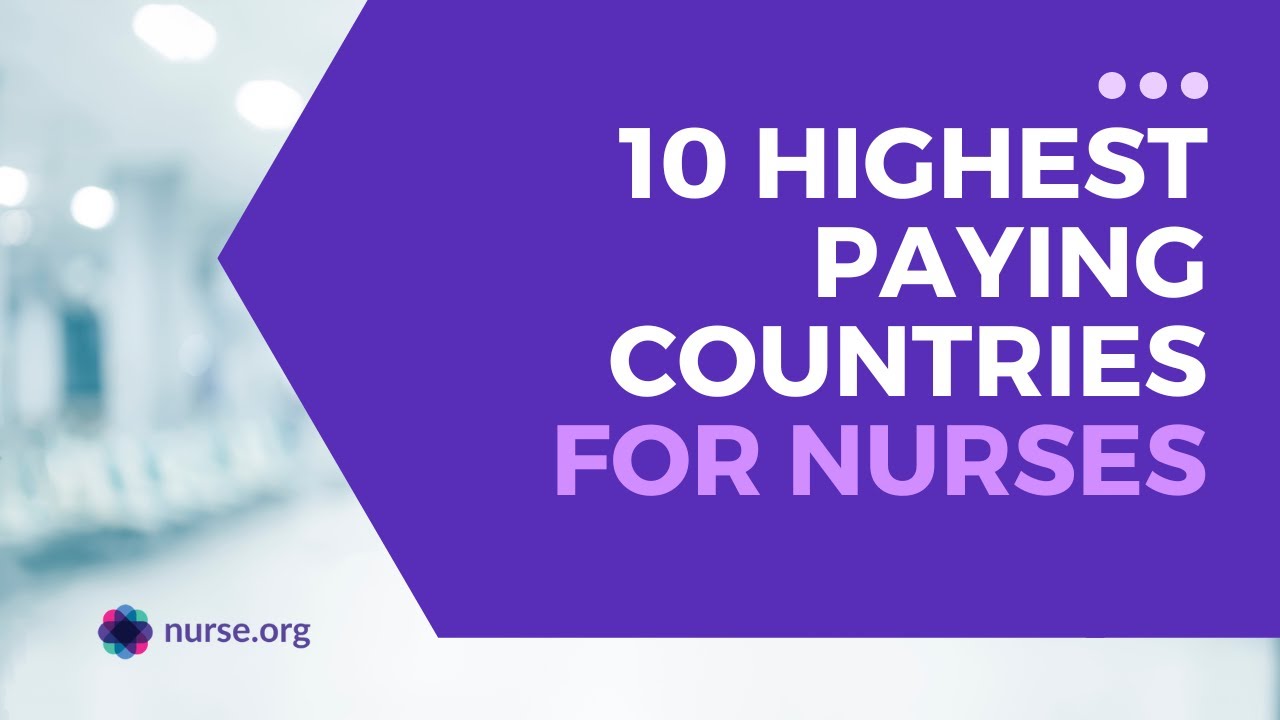
The Best Countries for Nurses to Work and Live: A Comprehensive Guide
For nurses seeking international opportunities, the question of where to practice their profession can be complex. Factors such as salary, working conditions, cost of living, and quality of life all play a significant role in determining the best country for nurses to work and live. This guide provides a comprehensive overview of several countries that offer attractive prospects for nursing professionals, balancing career advancement with personal well-being.
Factors to Consider When Choosing a Country
Before diving into specific countries, it’s crucial to understand the key factors that influence a nurse’s decision:
- Salary and Benefits: Competitive compensation packages, including health insurance, retirement plans, and paid time off, are essential.
- Working Conditions: Nurse-to-patient ratios, workload, and access to resources impact job satisfaction and professional growth.
- Cost of Living: The affordability of housing, transportation, food, and other necessities is a significant consideration.
- Quality of Life: Factors such as safety, access to healthcare, cultural attractions, and recreational opportunities contribute to overall well-being.
- Visa and Immigration Policies: The ease of obtaining a work visa and navigating the immigration process is crucial.
- Language and Cultural Adaptation: The ability to communicate effectively and integrate into the local culture can significantly impact a nurse’s experience.
Top Countries for Nurses: An In-Depth Look
Canada: High Demand and Excellent Benefits
Canada consistently ranks high as one of the best countries for nurses to work and live. The country faces a nursing shortage, creating ample job opportunities for both domestic and international nurses. Canadian healthcare is publicly funded, providing nurses with job security and comprehensive benefits packages. Salaries are competitive, and working conditions are generally favorable, with emphasis on patient safety and well-being. The diverse culture and high quality of life make Canada an attractive destination for nurses from around the world.
However, the immigration process can be lengthy, and nurses must pass the Canadian Registered Nurse Examination (CRNE) or the National Council Licensure Examination (NCLEX-RN) to become licensed. The cost of living in major cities like Toronto and Vancouver can be high, but smaller cities and rural areas offer more affordable options.
United States: High Salaries and Diverse Opportunities
The United States is another popular choice for nurses seeking international opportunities. The demand for nurses is high across the country, particularly in specialized areas such as critical care, oncology, and emergency medicine. Salaries for nurses in the US are among the highest in the world, and there are numerous opportunities for career advancement and specialization. The diverse healthcare system offers a wide range of practice settings, from large urban hospitals to small rural clinics.
To work as a nurse in the US, international nurses must pass the NCLEX-RN examination and obtain a visa. The immigration process can be complex and may require sponsorship from a healthcare employer. The cost of living varies widely depending on location, with major cities being more expensive than rural areas. While the US offers high earning potential, it’s essential to consider the high cost of healthcare and the potential for long working hours.
[See also: Nursing Career Paths in the US]
Australia: Outdoor Lifestyle and Strong Healthcare System
Australia is renowned for its beautiful landscapes, outdoor lifestyle, and strong healthcare system. The country offers excellent opportunities for nurses, particularly in rural and remote areas. Salaries are competitive, and working conditions are generally good, with emphasis on work-life balance. Australia’s healthcare system is publicly funded, providing nurses with job security and comprehensive benefits packages. The multicultural society and relaxed atmosphere make Australia an attractive destination for nurses seeking a change of pace.
To work as a nurse in Australia, international nurses must register with the Nursing and Midwifery Board of Australia (NMBA) and obtain a visa. The registration process may involve completing an assessment of qualifications and experience. The cost of living in major cities like Sydney and Melbourne can be high, but smaller cities and rural areas offer more affordable options. Adapting to the Australian accent and slang can also be a challenge for some nurses.
Germany: A Robust Economy and Growing Healthcare Needs
Germany’s robust economy and aging population have created a growing demand for nurses. The country offers competitive salaries, excellent benefits packages, and opportunities for professional development. German healthcare is highly regulated, ensuring high standards of care and patient safety. The country’s central location in Europe makes it an ideal base for exploring other European countries. For nurses seeking a stable and rewarding career in a well-developed healthcare system, Germany is an attractive option.
International nurses must have their qualifications recognized by the German authorities and obtain a visa to work in Germany. Learning the German language is essential for effective communication with patients and colleagues. While the cost of living in Germany is relatively affordable compared to other Western European countries, housing can be difficult to find in major cities. Navigating the German bureaucracy can also be challenging for newcomers.
Netherlands: Progressive Healthcare and Work-Life Balance
The Netherlands is known for its progressive healthcare system, emphasis on work-life balance, and high quality of life. The country offers competitive salaries, generous benefits packages, and opportunities for professional development. Dutch healthcare is patient-centered and emphasizes preventative care. The Netherlands’ vibrant culture, beautiful cities, and excellent infrastructure make it an attractive destination for nurses seeking a well-rounded experience.
To work as a nurse in the Netherlands, international nurses must have their qualifications recognized by the Dutch authorities and obtain a visa. Learning the Dutch language is essential for effective communication with patients and colleagues. The cost of living in the Netherlands is relatively high, particularly in major cities like Amsterdam. However, the country’s excellent public transportation system and bicycle-friendly infrastructure make it easy to get around.
Ireland: Strong Economy and Growing Healthcare Sector
Ireland’s strong economy and growing healthcare sector have created a demand for nurses, particularly in specialized areas such as geriatrics and mental health. The country offers competitive salaries, good benefits packages, and opportunities for professional development. Irish healthcare is undergoing significant investment, leading to improvements in facilities and resources. The friendly people, rich culture, and stunning landscapes make Ireland an attractive destination for nurses seeking a welcoming and rewarding environment.
International nurses must register with the Nursing and Midwifery Board of Ireland (NMBI) and obtain a visa to work in Ireland. The registration process may involve completing an assessment of qualifications and experience. The cost of living in Ireland is relatively high, particularly in Dublin. However, smaller towns and rural areas offer more affordable options. Adapting to the Irish accent and slang can also be a challenge for some nurses.
Preparing for International Nursing Opportunities
Regardless of the chosen country, several steps are essential for preparing for international nursing opportunities:
- Research Visa and Immigration Requirements: Understand the specific visa and immigration policies of the desired country.
- Credential Evaluation: Have your nursing qualifications evaluated by the relevant authorities.
- Language Proficiency: Improve your language skills to ensure effective communication.
- NCLEX-RN or Equivalent: Prepare for and pass the required nursing licensure examination.
- Networking: Connect with other international nurses and healthcare professionals in your target country.
- Financial Planning: Save enough money to cover travel expenses, visa fees, and initial living costs.
Conclusion: Finding the Right Fit
Choosing the best country for nurses to work and live is a personal decision that depends on individual priorities and circumstances. Canada, the United States, Australia, Germany, the Netherlands, and Ireland all offer attractive opportunities for nursing professionals. By carefully considering the factors outlined in this guide and conducting thorough research, nurses can make informed decisions and embark on fulfilling and rewarding international careers. Ultimately, the most important aspect is finding a country that aligns with your professional goals, personal values, and desired quality of life. For any nurse looking to expand their horizons, the possibilities are vast, and the rewards can be immense. Knowing which factors to consider and which countries offer the most promising environments will help ensure a successful and satisfying international nursing career. The decision to relocate for work is significant, and careful planning is key to a smooth transition and a positive experience. The demand for qualified nurses remains high globally, making this an opportune time for nurses to explore international options and find the best country for nurses to work and live for their unique needs and aspirations.

